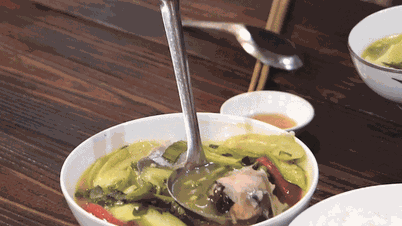Specifically, on the first day of Tet, most markets, supermarkets and shopping malls across the country were closed. In large cities, only Aeon Mall and Gigamall were still open to serve the city's residents, with service hours from 10:00 a.m. to 10:00 p.m. On the second day, people began to visit to wish a happy new year, meet and go on spring outings, so large supermarkets such as Coop mart, Satra, etc. opened. In large cities, some large wholesale markets and some small markets began to sell goods, but mainly focused on fresh food items.
On the 3rd, 4th and 5th of Tet, most traditional and convenient supermarkets and shopping malls in cities across the country have opened for sale; in which, most supermarket systems and convenience stores have reopened such as BigC, Aeon Mall, Gigamall, Coopmart, CircleK, Winmart... trading activities have almost returned to normal, however, consumer demand at the beginning of the year is not high, mainly focusing on some essential items such as fresh seafood, fresh vegetables and fruits, food and beverage services, tourism services, entertainment, car parking services, passenger transport services...
According to the Price Management Department, the 2024 Lunar New Year takes place in early February of the solar calendar, so from January to the first week of February is the peak time for preparing goods for Tet, the market supply and demand situation is bustling according to the annual rule. Near Tet, the demand for shopping to serve the production and processing of food for sale on the occasion of Tet as well as restaurant catering services at the end of the year increases, but the prices of essential goods basically do not fluctuate much due to abundant supply. There is no shortage of goods or price fever in the market, people are changing their habits to economical shopping and reasonable spending during Tet. According to data from the General Statistics Office, the consumer price index in January 2024 increased by 0.31% compared to the previous month and increased by 3.37% compared to the same period in 2023. Core inflation in January 2024 increased by 2.72% over the same period last year.
In the first week of February, entering the pre-Tet period and serving the worshiping needs of Ong Cong Ong Tao, people's shopping demand increased, mainly focusing on food items, incense flowers, and fruits. Purchasing power increased but supply was abundant, so in general, prices were quite stable, only some items such as fresh incense flowers increased by more than 40%, fruits and incense chickens increased by 10%-15%. Meanwhile, some items such as red carp or votive offerings had poor purchasing power, prices were stable and even decreased at times.
Through monitoring and grasping the market price developments in localities, it shows that, basically, the market price developments in January, the first week of February and during Tet holidays did not have any unusual fluctuations, some essential goods for Tet increased according to the law or according to the world price developments. Shopping activities on the 29th and 30th of Tet focused mainly on some items serving the year-end party at families and New Year's Eve offerings such as vegetables, fresh foods, fruits, alcohol, tobacco and candy.
During the period before Tet, prices of basic essential goods increase according to the law due to high shopping demand in the capital , most people focus on shopping on the 28th and 29th of Tet.
Through a survey at Doan Thi Diem market, Vu Thanh market, Giang Vo, Cat Linh: prices of goods are relatively stable, except for chicken prices which increased by 10,000-20,000 VND/kg compared to the 29th of Tet to 160,000-180,000 VND/kg due to increased demand for Tet 30th and New Year's Eve. In supermarkets, goods are stable, many goods are on sale and promotion for the Lunar New Year.
Tay Ho District (Tam Da Market, Lotte Mart Supermarket): On February 9, 2024 (30th of Tet), at Lotte Mart Supermarket and the market, the supply of goods is abundant, diverse in food, foodstuffs, fruits, fully meeting the shopping needs of people, so there is basically no shortage of goods, unusual fluctuations. People's shopping needs also increased compared to normal days, the number of people coming to supermarkets and traditional markets is bustling. Regarding prices, compared to normal days, some types of meat such as beef, fruits, and green vegetables are stable compared to the 27th and 28th of Tet, however, the price level compared to normal days also increased slightly.
Tho Quan Market, Kham Thien: Basically, on the 30th of Tet, the market is relatively stable compared to yesterday, the 29th of Tet, mainly increasing the prices of worship items such as fresh flowers, green vegetables and fresh food. The price of chrysanthemums is 5,000 - 7,000 VND/kg, lilies are 250,000 - 300,000 VND/dozen, single flowers are 150,000 VND/dozen, green mustard is 10,000 VND/bunch, celery is 15,000 VND/bunch, small broccoli is 20,000 VND/piece, large white broccoli is 25,000 VND/piece, good quality chicken for New Year's Eve is 300,000 VND/kg, shrimp is 370,000 VND/kg, beef tenderloin is 350,000 VND/kg, good quality beef shank is 360,000 VND/kg...
During the first days of the year, shopping activities were not much on the first and second days of Tet and gradually returned to normal on the third and fourth days when most supermarket systems returned to normal operations; in addition, there are also stores belonging to the Circle K convenience store system in Hanoi's inner city districts that operate throughout Tet, thus always ensuring a source of goods to serve the needs of the capital's people during the Lunar New Year holiday.
In Ho Chi Minh City: Small traders in markets have started selling again to serve people's needs, normal purchasing power focuses mainly on vegetables, tubers, fruits, fresh flowers, and fresh food. At wholesale markets, the amount of goods imported to the market is about 25% -45% compared to normal days; prices of essential goods such as food and foodstuffs have started to decrease and are at the same level as normal days, specifically:
At Thu Duc wholesale market: The amount of vegetables and fruits arriving at the market is about 788 tons/day, equivalent to the previous day, down 45% compared to the same period last year and equal to about 26% compared to normal days. Wholesale prices of vegetables, fruits and fruits are generally stable compared to the previous day, except for the low supply of squash because the gardeners have not harvested much at the beginning of the year, purchasing power has increased, prices have increased slightly by 2,000 VND/kg; spinach and white beans have not arrived in large quantities, the market is deserted so prices have decreased by 5,000-8,000 VND/kg, Hoa Loc mangoes have increased by 15,000 VND/kg.
Compared to the same period last year, prices of vegetables, tubers and fruits mostly increased or decreased by 2,000 VND/kg - 10,000 VND/kg; Da Lat onions decreased by 15,000 VND/kg, Vinh Chau red onions decreased by 25,000 VND/kg, while Ban Me ginger increased by 22,000 VND/kg, ...
Compared to the same period last year, wholesale prices of fruit products increased or decreased by 5,000-10,000 VND/kg such as oranges, watermelons, longans, red grapes, tangerines, dragon fruit; grapefruit decreased by 15,000 VND/kg, Chinese pears decreased by 20,000 VND/kg, American apples decreased by 22,500 VND/kg, etc.
At Hoc Mon wholesale market: the output of vegetables and fruits imported to the market was 1,030 tons (including 845 tons of vegetables and fruits, 137 tons of fruits), up 31% compared to the previous day, up 12% compared to the same period last year and equal to about 45% compared to normal days, pork started entering the market from today with 48 tons, down 85% compared to the same period last year, currently 183 stalls have reopened. The prices of most vegetables and fruits have returned to normal prices.
At retail markets: Prices of poultry eggs, poultry meat, seafood... are mostly stable compared to the previous day, while some vegetables, fruits, pork, and Tet flowers have decreased by 5,000-10,000 VND, specifically:
In Da Nang , the market situation in the days before Tet began to be bustling and bustling with buying and selling on February 7, 8, and 9 (December 28, 29, and 30 of the lunar calendar). At the markets, buying and selling were most concentrated at stalls selling fruits, cakes, jams, and various foods. Although prices fluctuated, the increase was not much, mainly in some essential consumer goods such as fresh meat, large tuna, fruits, and flowers of all kinds. Supermarkets, markets, and businesses increased the supply of goods to the market, ensuring a sufficient supply of goods for the market, with a diverse and abundant variety to meet people's shopping needs.
On February 10 and 11 (the first and second days of Tet), most markets were still closed, with only a few traders outside. There were few buyers and sellers, so prices were similar and in some places were slightly higher than on the 29th and 30th of Tet. The markets on the third and fourth days of Tet began to reopen, people went shopping for offerings and some businesses also opened for the first sale of the year.
According to the Price Management Department (Ministry of Finance), some factors that put pressure on the price level after Tet are that the first quarter coincides with the time when many year-end festival activities and the Lunar New Year of Giap Thin take place, prices often fluctuate and increase according to the rule before and after Tet (in January, which is the festival month, prices of goods and services for food, entertainment, and travel often increase).
At the same time, there are also some key factors that reduce pressure on the price level: the prices of some essential goods often increase during Tet holidays and then gradually decrease back to normal after Tet. In some provinces and large cities, many supermarkets and stores have reopened to serve the demand for essential goods, the supply of goods is no longer interrupted and will fully meet the consumption needs of the people. The supply of domestic consumer goods, food and foodstuffs is still abundant, meeting the needs of the people, so prices are not expected to fluctuate much.
In addition, the experience and steadfastness in the policy of stabilizing the macro economy and controlling inflation of the National Assembly and the Government in recent years and in the coming time will help strengthen the confidence of businesses and people in a stable macro-economic environment, thereby stabilizing inflation expectations.
Therefore, the Ministry of Finance recommends that ministries, branches and localities have the responsibility to organize and closely monitor the supply and demand developments and market prices of goods under their management in order to have appropriate management measures. Along with that, proactively forecast and have plans to ensure balance of supply and demand, especially during times when the market has high demand for essential goods such as gasoline, construction materials, food, pork and other fresh food items, agricultural supplies, transportation services, etc. to avoid shortages and disruptions in supply sources that cause sudden price increases./.
Source link



































































































Comment (0)